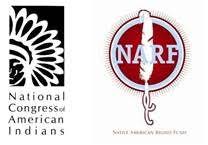
Since 1971, the Native American Rights Fund (NARF) has provided legal assistance to Indian tribes, organizations, and individuals nationwide who might otherwise have gone without adequate representation. NARF has successfully asserted and defended the most important rights of Indians and tribes in hundreds of major cases, and has achieved significant results in such critical areas as tribal sovereignty, treaty rights, natural resource protection, and Indian education. NARF is a non-profit 501c(3) organization that focuses on applying existing laws and treaties to guarantee that national and state governments live up to their legal obligations.
The Native American Rights Fund is headquartered in Boulder, Colorado, with branch offices in Washington, D.C., and Anchorage, Alaska.
NARF is governed by a volunteer board of directors composed of thirteen Native Americans from different tribes throughout the country with a variety of expertise in Indian matters. A staff of sixteen attorneys handles over fifty major cases at any given time, with most of the cases taking several years to resolve. Cases are accepted on the basis of their breadth and potential importance in setting precedents and establishing important principles of Indian law.
With credibility built over forty-five years of service, NARF has become a respected consultant to policy makers and others engaged in drafting legislation. As a consensus builder, NARF works with religious, civil rights, and other Native American organizations to shape the laws that will help assure the civil and religious rights of all Native Americans. The staff of NARF, many of whom are Native American, use their understanding of Indian legal issues to assist tribes in negotiating with individuals, companies, and governmental agencies. This emphasis helps tribes in all fifty states to develop strong self-governance, sound economic development, prudent natural resources management, and positive social development.
Since NARF’s inception, Indian law has dramatically changed. It has become a recognized specialty with a well-documented body of statutes and case law. However, that has not made it a simpler field. In the 1970’s and the early 1980’s, courts were generally receptive to Indian rights cases. However, since the mid to late 1980’s, an increasingly conservative federal bench has made Indian rights cases more difficult to win. Combined with the huge cost of litigation—in time and in money—this means NARF and its Indian clients are always attuned to opportunities for negotiation, consensus, and settlement.
How NARF Has Helped
Throughout its history, NARF has impacted tens of thousands of Indian people in its work for more than 250 tribes. Some examples of the results include:
- Protecting and establishing the inherent sovereignty of tribes
- Obtaining official tribal recognition for numerous Indian tribes
- Helping tribes continue their ancient traditions, by protecting their rights to hunt, fish and use the water on their lands
- Helping to uphold Native American religious freedom
- Assuring the return of remains and burial goods from museums and historical societies for proper and dignified re-burial
- Protecting voting rights of Native Americans
